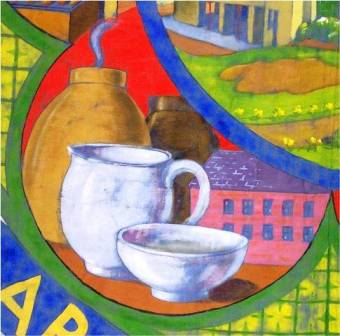




WEST LOTHIAN POTTERY COMPANY LIMITED
Bo’ness Journal, December 14th, 1895:
The industrial pottery at Grangepans, Bo’ness Co-operative Pottery Society, was sold this week to Mr. James Hutton
of Culross Coal Society for £4000, after it had lain idle for some years. Work was hoped to commence at the pottery
as soon as possible.
By 12th March 1896, James Hutton, with the aid of local businessmen and farmers, had formed the West Lothian Pottery Company
Limited with a nominal capital of £25,000.
These original share holders were:
James Hutton, Viewforth, Low Valleyfield, by Dunfermline
Robert Mickel, Bonnytoun, Linlithgow
Andrew Drysdale, Builder, Bo’ness
James Cunningham, Mining Contractor, Dunfermline
William Thomas Whyte, C.A., Edinburgh
James Young, Farmer, Mannerston, Linlithgow
James Balderston, Publican, Bonnyrigg
Patrick Callander, Leather Merchant, Linlithgow
After two years of indifferent success, they appointed John McNay in 1898 as the managing director. John was the nephew of
C.W. McNay and was working in his uncle’s Bridgeness Pottery at the time of his appointment. Time would show that John McNay
provided the impetus required to turn the business into a great success.
On 15th December 1900, the kilnmen at both the West Lothian and Bridgeness Potteries went on strike. Both managements stood firm
and the kilnmen returned to work 3 days later after abandoning their claim. Work resumed as normal.
The company suffered a setback on 10th December 1901, when fire broke out in a packing shed. The packing rooms, warehouses and
offices forming the north- western portion of the works were totally destroyed. Goods made for the Christmas and New Year trade were
also lost. The total damage was estimated at £2,000. The West Lothian Courier reported that the fire started when a little girl lighting a
gas stove dropped her light amongst some straw.
On 22nd February 1904, at the annual general meeting held in the Star and Garter Hotel, Linlithgow, the company chairman, Mr Robert
Mickel, reported of a very successful year’s business and added that the principal credit was certainly due to the excellent management
of Mr McNay.
Four years later, at the Annual General Meeting of 1908, the Chairman explained that the large increase in the cost of coal and raw
materials had decreased the dividend. If not for these unexpected expenses, the accounts would have shown the best year’s trading in
the history of the company. Turnover had increased and the quality of trade had been maintained.
On 3rd September 1910, the glost and biscuit kiln men along with other members of the National Society of Male and Female Workers
went on strike. They requested the reinstatement of a presser, who also acted as secretary to the local branch of the union and had
been paid off ten weeks previously. The manager was accused of showing hostility towards trades unionism, a claim he denied. The
management stood firm, even after the arrival of union’s general secretary from Staffordshire. Eventually the management declared
their intention of attempting to carry on independent of the strikers and if that failed, rather than submit to union demands, they would
close. The outcome of the dispute was not reported, however, the pottery did not close.
The pottery was hit hard by the First World War. Potters fighting for their country left the company short of skilled staff. Trade was
curtailed due to the hostilities and the price of raw materials had increased considerably.
Despite this, the pottery survived and in 1917, John McNay became a shareholder with 200 shares. That same year, the directors
announced a credit balance of £856. 13s. 1d.
In his book, Scottish Pottery, J. Arnold Fleming tells us in 1923:
Mr McNay has secured not only the confidence of his company but of all his fellow manufacturers, and was appointed
Chairman of the (Scottish Earthenware) Association, which position he at present fills with great acceptance.
He continues: Besides producing articles of general domestic utility in a good quality of whiteware, the factory has
revived many old Scottish cottage ornaments made many years ago in the Bo’ness pottery.
On 19th February 1923, following the annual general meeting, at a function in the Star and Garter Hotel, Linlithgow, John McNay was
presented with a diamond scarf-pin in recognition of his 25 years as manager. Once again, Mr McNay was praised for his excellent
management, a skill which could be measured by the great loyalty and respect he received from his workers.
However, the economic depression of the late 1920s took hold. The export market had dwindled, mass unemployment hit central
Scotland and the miners strike of 1926 reduced manufacturing output.
Despite the early success and the air of optimism in Fleming’s words, by 1929 the local press reported:
Bo’ness Journal, March 23rd, 1929:
The West Lothian Pottery Co. Ltd, Bo’ness has gone into voluntary liquidation, and Mr George K Johnston, of Messers
Johnston and Smillie, C.A., Albany Street, Edinburgh, has been appointed liquidator.
This decision was reached at a meeting of the shareholders, and the works are offered for sale as a going concern.
Failing the disposal in that way, machinery, plant and stock will be sold off and the premises made available for any
trade or business concern that may come along.
For several years the pottery trade in the country has suffered from foreign competition and amongst others has been
hard hit. Its troubles were accentuated by the coal strike of 1926.
Matters then reached a crisis and the business before and since - that is for the past four years - has not shown a
profit. Rather than risk further depreciation of capital, the shareholders reluctantly decided to cut their loses and close
down.
All hands were accordingly given notice, and the gates will be closed finally today (Saturday). The number of hands
affected is 105, 35 of whom are men and the remainder girls.
The company was formed 32 years ago to carry on business as general earthenware manufacturers, decorative and
plain.
The capital was £15,000 in shares of £5 each, and these, fully paid, are held by seventeen shareholders.
The first chairman of the company was the late Mr Robert Mickel, Rivalsgreen, Linlithgow, who held the position for 27
years. He was succeeded by Mr Patrick Callender, Linlithgow. The present chairman is Mr Frank O. Mickel.
Mr John McNay, who has been for fully half a century connected with the pottery industry in Bo’ness is managing
director to the West Lothian Company, and no one feels so keenly as he does the severance, and the inevitable
dispersal, in these trying times, of a loyal band of employees.